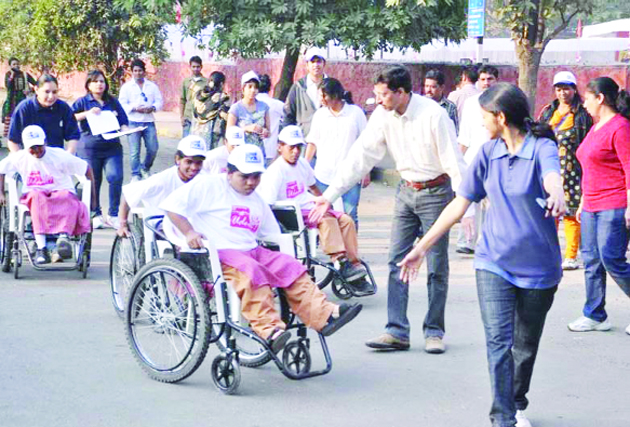Ram Rattan Sharma
In a recent radio broadcast of Mann Ki Baat, Prime Minister Narendra Modi recognized differently-abled individuals as possessing a divine spirit, referring to them as Divyang. Currently, over 1 billion people worldwide, accounting for 15% of the global population, live with disabilities. According to the 2011 census, approximately 26.8 million individuals in India have disabilities, representing around 2.21% of the population. Notably, the prevalence is higher in rural areas and specific states, including Maharashtra, Andhra Pradesh, Odisha, Jammu and Kashmir, and Sikkim. Statistics indicate that individuals with disabilities are an essential segment of society. However, they still experience discrimination, exclusion, and deprivation of their rights. This scenario necessitates the implementation of various laws, initiatives, and regulations aimed at promoting equality. Before delving into these laws, it is paramount to comprehend the various types of disabilities and the challenges these individuals encounter.
Challenges Faced by Divyangs:
People with disabilities, or Divyangs, frequently suffer from the lack of essential support services. This inadequacy often prevents them from accessing basic education or vocational training. According to the India Social Development Report (SDR), about 45% of all persons with disabilities in India are illiterate. Contributing factors to this illiteracy include the scarcity of special schools, qualified teachers, and educational resources for the disabled, reflecting a significant lack of inclusivity.
Furthermore, individuals with disabilities are often denied employment opportunities, leading to a cycle of poverty. Many public spaces in India are not equipped to meet the special needs of disabled individuals, and the lack of accessible facilities hinders their ability to contribute meaningfully to society.
Differently-abled individuals also confront day-to-day discrimination, facing humiliation, exclusion, and negative stereotypes that hinder their active engagement in public life.
Government Initiatives in India:
India has ratified the United Nations Convention on the Rights of Persons with Disabilities (UNCRPD) in 2007, and since then, the Government has undertaken several measures to promote the inclusion and empowerment of persons with disabilities (PWDs)/Divyangs in accordance with its obligations. A few of these measures include:
- Assistance to Disabled Persons for Purchasing/Fitting of Aids/Appliances (ADIP) Scheme (1981): Launched to support disabled individuals in acquiring durable and scientifically manufactured aids and appliances, promoting their physical, social, and psychological rehabilitation.
- Deen Dayal Disabled Rehabilitation Scheme (DDRS) (2003): Aimed at fostering an enabling environment that guarantees equal opportunities, social justice, and empowerment for persons with disabilities by providing financial aid to voluntary organizations.
- Scholarships for Persons with Disabilities (PWDs) (2014-15): This program offers financial assistance to parents of students with disabilities at pre and post-matriculation levels.
- Accessible India Campaign (2015): Known as Sugamaya Bharat Abhiyan, this campaign focuses on enhancing accessibility in physical environments, transportation systems, and information communication ecosystems.
- National Trust Schemes: The National Trust, an autonomous organization under the Ministry of Social Justice and Empowerment, focuses on the welfare of people with disabilities such as autism, cerebral palsy, mental retardation, and multiple disabilities. Programs like DISHA provide early interventions through therapies and support for family members, while Vikas Day Care caters to individuals over the age of 10.
- Unique Disability IDs: This initiative of the Department of Empowerment of Persons with Disabilities aims to implement a comprehensive system for issuing unique disability IDs and certificates.
- National Fellowship for Students with Disabilities (Rajiv Gandhi National Fellowship): This scheme aims to enhance opportunities for students with disabilities pursuing higher education, offering 200 fellowships each year.
- The Rights of Persons with Disabilities Act, 2016: This legislation was enacted by the Indian Parliament to fulfill obligations under the UNCRPD, covering seven categories of disabilities including blindness, low vision, leprosy, hearing impairment, locomotor disability, mental retardation, and mental illness, enhancing rights and entitlements for persons with disabilities.
Moving Forward:
The Constitution of India ensures equality, freedom, justice, and dignity for all and mandates an inclusive society for everyone, including persons with disabilities. This responsibility extends to state governments as well. Individuals with disabilities require additional support, especially in challenging times like the pandemic. We, as a society, will falter if we fail to respond compassionately with affirmative action for people with disabilities. A collaborative, multi-sectoral approach involving all stakeholders—including the Government of India, ministries, state governments/UTs, public and private sectors, local authorities, and NGOs—is essential. Appropriate authorities must prioritize activities designed for the empowerment of Divyangjans.
(The author is a former Deputy Librarian at the University of Jammu)


Leave a Reply